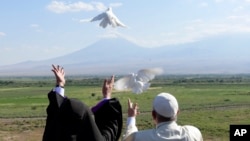For most in Armenia, Pope Francis’ visit will be best remembered for his willingness to declare the Ottoman-era slaughter of Armenians “genocide” and for his message of peace and reconciliation with Turkey.
For ethnic Armenians who have fled the war in Syria, however, the call for peace relates more personally to the ongoing conflict that has taken the lives of loved ones and driven them from their homes.
Angela Agemyan and her three children, who are among an estimated 17,000 ethnic Armenian refugees from Syria now living in Armenia, watched the pope's visit this weekend on television from their new home in Yerevan, the capital.
“Peace for us is the most important thing,” said Agemyan, 35. “The peace that we had in my family is lost.”
The number of Armenians in Syria swelled in the early 20th century when Armenian families were deported to Syrian deserts by the Ottoman Turks. Up to 100,000 Armenians were estimated to live in Syria when the conflict there began in 2011.
For the many that have fled, Armenia has been a hospitable, if poor, haven.
Agemyan fled Aleppo with her young children in 2014 after her husband was killed by militants from the Islamic State group for refusing to renounce his Christian faith. She doubts that she will ever go back to Syria.
“I have a house there and my parents are there as well. But that's not the point,'' Agemyan said. “I will have to think about my children and how they would be there spiritually. There are many things I'll have to consider. It would be very difficult to go back.''
Accepting the refugees has become a significant burden for this former Soviet nation of 3 million people, which has been reeling from a crippling economic blockade imposed by neighboring Turkey to support its ally Azerbaijan in the conflict with Armenia over the Nagorno-Karabakh region. But the impoverished country has eagerly welcomed the newcomers, helping with accommodation, providing various subsidies and fast-tracking the procedure for acquiring citizenship.
Most prefer to stay in Yerevan, resisting offers to relocate to cheaper housing elsewhere in the country. An attempt to build apartment buildings to accommodate refugees outside the capital was met with little enthusiasm and failed.
Most Syrian Armenians come from Aleppo, Syria's largest city and its commercial capital before the war. The city has been an arena of fierce battles since it was split into government- and opposition-controlled parts in 2012.
While economic conditions in Armenia can be challenging, refugees say what they appreciate most is the warm welcome they have received.
"On the very first day, four neighbors knocked on our door and offered help,” said Saro Yapundzhian, a refugee from Aleppo who works as a manager at a Yerevan cafe.
Although the unemployment rate in Armenia is high, at about 17 percent, refugees' skills have helped them to find jobs as doctors, jewelers, mechanics, hair stylists and cooks. Syrian restaurants have become increasingly popular.
Agemyan bakes cakes and pastries to try to make ends meet. “Here we are safe and have adapted,” she said, adding that her children, ages 6, 9 and 12, feel welcome at the local school and have quickly learned the eastern dialect of the language spoken in Armenia. The refugees already speak the western dialect of Armenian, which has made their adaptation easier.
Pope Francis, who wrapped up his three-day visit to Armenia on Sunday, has long championed the Armenian cause. In the most carefully watched speech of his trip, the pope ad-libbed the politically charged word “genocide” to his prepared text.
Turkey rejects the term, saying the 1.5 million death figure cited by historians is inflated and that people died on both sides as the Ottoman Empire collapsed amid World War I.




